Jathedar of Akal Takht
The jathedar of Akal Takht (Punjabi: ਜੱਥੇਦਾਰ ਅਕਾਲ ਤਖ਼ਤ) is the head of Akal Takht, and the international representative of the Sikhs.
| Jathedar of Akal Takht
ਜੱਥੇਦਾਰ ਅਕਾਲ ਤਖ਼ਤ | |
|---|---|
 | |
Incumbent Dhian Singh Mand (Sarbat Khalsa) since 10 November 2015 Harpreet Singh (SGPC) since 22 October 2018 Acting | |
| Style | Bhai Sahib (informal) Honorable Jathedar (formal) Singh Sahib (formal) |
| Status | Head of Akal Takht Representative of Sikhs |
| Member of | Khalsa |
| Reports to | Sikhs |
| Seat | Akal Takht |
| Nominator | Sikh institutions |
| Appointer | Sarbat Khalsa SGPC |
| Term length | Indefinitely The holder is required to have the consensus of Sikh institutions. |
| Formation | 1618 |
| First holder | Bhai Gurdas as custodian of Akal Takht |
Originally known as Akal Bunga,[1] the building directly opposite Darbar Sahib was built by Guru Hargobind as a place of justice and consideration of temporal issues; the highest seat of earthly authority of the Khalsa and the podium of the jathedar of Akal Takht, the most senior spokesperson of the Sikhs.
In the absence of Jagtar Singh Hawara, Dhian Singh Mand and Harpreet Singh are the interim acting jathedars of Akal Takht.
Origin
In 1606, after the execution of Guru Arjan, Guru Hargobind, bearing the two swords of politics (miri) and spirituality (piri), declared himself sovereign, and defied the royal edict of the Mugal empire.[2] Recognising the necessity of coordinating efforts against the Mughal empire, the Guru simultaneously began the process of militarising the Sikhs. The first hukamnama issued from Akal Takht commanded the Sikhs to offer arms and horses.[3] Before leaving Amritsar for imprisonment, Guru Hargobind assigned the original scribe of Guru Granth Sahib, Bhai Gurdas as the custodian of Akal Takht, and instructed him to act jointly with Baba Buddha as the representative of the Sikhs.
Following the establishment of the Khalsa, which took effect on 13 April 1699, Guru Gobind Singh sent Mani Singh and five other Khalsas to Amritsar with instructions to take possession of the Darbar Sahib complex. The Khalsas assigned Mani Singh as the head granthi of Darbar Sahib and the jathedar of Akal Takht. After the passing of Guru Gobind Singh, the Sikh divisions accepted the common leadership and sovereignty of Akal Takht.[4]
Selection process
During the 18th and 19th centuries, jathedars of Akal Takht were appointed by the Sarbat Khalsa, a biannual deliberative assembly of the Sikhs held at Amritsar.[5] From 1921, jathedars have been appointed by Shiromani Gurdwara Parbandhak Committee (SGPC), an elected body of the Sikhs.[6]
A Sarbat Khalsa convened by Sikh organisations in 2015 appointed Jagtar Singh Hawara as the jathedar of Akal Takht. At the time, former SGPC president, Avtar Singh Makkar, condemned the convening as against the principles of Sikhism and it's decisions null and void. He added that the removal of jathedars came under the Sikh Gurdwaras Act 1925 and no one could challenge the SGPC's authority.[7]
List
- Colour key
| No. | Name (Birth–Death) |
Portrait | Assigned by | Term of office | ||||
|---|---|---|---|---|---|---|---|---|
| Custodians of Akal Takht | ||||||||
| 1 | Bhai Gurdas (1551–1636) |
Guru Hargobind | 1618 | 1636 | ||||
| 2 | Mani Singh (1644–1737) |
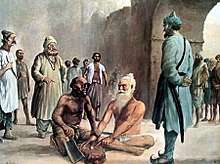 |
Guru Gobind Singh | 1721 | 24 June 1734 | |||
| Jathedars of Akal Takht | ||||||||
| 3 | Darbara Singh (1644–1734) |
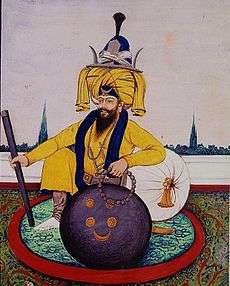 |
Sarbat Khalsa | 1722 | 1734 | |||
| 4 | Kapur Singh Virk (1697–1753) |
 |
Sarbat Khalsa | 1737 | 1753 | |||
| 5 | Jassa Singh Ahluwalia (1718–1783) |
 |
Sarbat Khalsa | 1753 | 1783 | |||
| 6 | Phula Singh (1761–1823) |
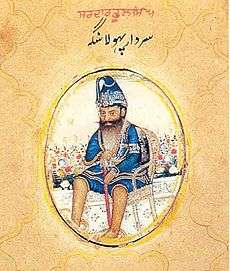 |
Sarbat Khalsa | 1800 | 1823 | |||
| 7 | Hanuman Singh (1755–1846) |
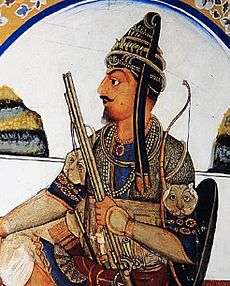 |
Sarbat Khalsa | 1823 | 1846 | |||
| 8 | Prahlad Singh |
 |
Sarbat Khalsa | 1846 | Unknown | |||
| Sarbrah of Akal Takht | ||||||||
| 9 | Arur Singh Naushera 1865-1926 |
 |
British East India Company | 1907 | August 1920 | |||
| Jathedars of Akal Takht | ||||||||
| 10 | Teja Singh Bhuchar |
Sarbat Khalsa | 12 October 1920 |
1921 | ||||
| (11) | Teja Singh Akarpuri 1892-1975 |
 |
SGPC | 29 April 1921 |
13 October 1923 | |||
| (12) | Udham Singh Nagoke (1894-1966) |
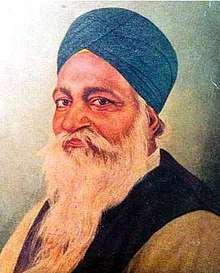 |
SGPC | 1923 | 1924 | |||
| (13) | Acchar Singh (1893-1976) |
 |
SGPC | 09 February 1924 |
10 January 1926 | |||
| (12) | Udham Singh Nagoke (1894-1966) |
 |
SGPC | 10 January 1926 |
short period | |||
| (11) | Teja Singh Akarpuri 1892-1975 |
 |
SGPC | 27 November 1926 |
21 January 1930 | |||
| 14 | Didar Singh |
SGPC | 1925 | short period | ||||
| 15 | Jawaher Singh Mattu Bhaike |
SGPC | 1926 | short period | ||||
| 16 | Gurmukh Singh Musafir |
SGPC | 1931 | 1934 | ||||
| 17 | Wasakha Singh Dadehar (1877-1957) |
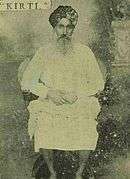 |
SGPC | October 1934 |
December 1934 | |||
| 18 | Mohan Singh Nagoke (1896-1969) |
SGPC | 1935 | 1952 | ||||
| 19 | Partap Singh (1904-1984) |
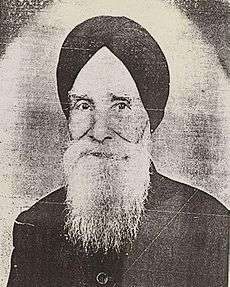 |
SGPC | 1952 | 1954 | |||
| (13) | Acchar Singh (1893-1976) |
 |
SGPC | 23 May 1955 |
08 November 1962 | |||
| 20 | Mohan Singh Tur (1916-1979) |
SGPC | ||||||
| 21 | Sadhu Singh Bhaura (1905-1984) |
SGPC | 1964 | 1980 | ||||
| 22 | Gurdial Singh Ajnoha (1927-1982) |
SGPC | 2 March 1980 |
1983 | ||||
| 23 | Kirpal Singh (1918-1993) |
SGPC | 1983 | 26 July 1986 | ||||
| 24 | Jasbir Singh Rode |
Sarbat Khalsa | 9 March 1988 |
1989 | ||||
| 25 | Darshan Singh (born 1940) |
SGPC | 1989 | 1990 | ||||
| 26 | Manjit Singh |
SGPC | 1994 | 1997 | ||||
| 27 | Ranjit Singh |
SGPC | 1997 | 1999 | ||||
| 28 | Puran Singh |
SGPC | 1999 | 2000 | ||||
| 29 | Joginder Singh Vadanti |
SGPC | 2000 | 2008 | ||||
| 30 | Gurbachan Singh (born 1948) |
SGPC | 06 August 2008 |
18 October 2018 | ||||
| 31 | Jagtar Singh Hawara (born 1973) |
Sarbat Khalsa | 10 November 2015 |
Incumbent | ||||
| Acting Jathedars of Akal Takht | ||||||||
| 1 | Partap Singh (1904-1984) |
 |
SGPC | 1938 | 1948 | |||
| 2 | Kirpal Singh (1918-1993) |
SGPC | 1963 | 1965 | ||||
| 3 | Gurdev Singh Kaunke (1949-1993) |
Sarbat Khalsa | 26 January 1986 |
1993 | ||||
| 4 | Gurbachan Singh Manochahal (1954-1993) |
Sarbat Khalsa | 27 April 1986 |
26 January 1987 | ||||
| 5 | Darshan Singh (born 1940) |
SGPC | 31 December 1986 |
9 March 1988 | ||||
| 6 | Dhian Singh Mand |
Sarbat Khalsa | 10 November 2015 |
Incumbent | ||||
| 7 | Harpreet Singh |
SGPC | 22 October 2018 |
Incumbent | ||||
References
- "Akal Bunga". The Sikh Encyclopedia. Gateway to Sikhism Foundation. Retrieved 21 October 2016.
- Dilgeer, Harjinder Singh (1980). The Akal Takht. Jalandhar: Sikh University Press.
- Singh, Surinderpal. "Celebrating the foundation day of Akal Takht Sahib (Akal Bunga)". Sikhri. Retrieved 29 May 2020.
- Chauhan, G.S. (2005). The Gospel Of The Sikh Gurus. New Delhi: Hemkunt Publishers. p. xiv. ISBN 81-7010-353-3.
- Singha, H.S. (2005). The Encyclopedia of Sikhism. New Delhi: Hemkunt Publishers. p. 14. ISBN 81-7010-301-0.
- "About SGPC". Shiromani Gurdwara Parbandhak Committee. Retrieved 29 May 2020.
- At Sarbat Khalsa, hardliners appoint Hawara Akal Takht Jathedar